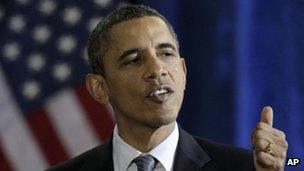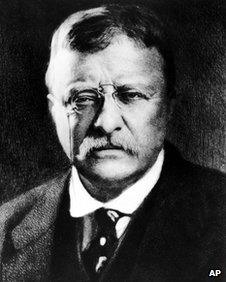'Make-or-break' for middle class
- Published
- comments

President Barack Obama evoked the memory of a Republican icon in Tuesday's speech in Kansas
Barack Obama's campaign for re-election has just cranked up a notch.
The US president has gone to Kansas to make a big economic speech, saying this is a make or break moment for the American middle class and that the ongoing debate about tax is "the defining issue of our time".
It sets the stage for a 2012 battle between two very different economic visions.
Mr Obama said the battle would be about "reclaiming American values".
He has condemned his Republican opponents for what he called "you're on your own economics" and said that the trickle-down theory - that when the rich get richer so does everybody else - "has never worked".
His speech was thin on details of anything new but he said it was important "everyone gets a fair shot - plays by the same rules".
Mr Obama deliberately made the speech in Osawatomie, Kansas, to echo Teddy Roosevelt's call for a "New Nationalism" in 1910.
He said Roosevelt was the son of a wealthy family but knew the "free market was not a free licence to take whatever you can, where ever you can".
Roosevelt, Mr Obama said, broke up monopolies and set out policies that led to a progressive income tax and worker protection.
Wilderness worries
But it is a little odd that the White House wants comparisons to be made, external.
It is true: Roosevelt's was an important and memorable speech. He coined the phrase "a square deal", which still resonates today, external.

Theodore Roosevelt advocated progressive social policies as president
It allowed Mr Obama to make the point he is not the first politician to be attacked in strong terms, acknowledging that Roosevelt was condemned at the time as "communistic" and "socialistic".
He did not mention it sparked a newspaper debate about whether Roosevelt was a maniac or merely ignorant.
But that is not what is odd about celebrating this speech. It set the ex-president on a noble path to eventual oblivion.
The Republican Roosevelt was one of the great presidents of the last century. But the speech, external was made after he had left office.
It marked his break with the Republican party and the beginning of his campaign for the presidency in 1912 as the Progressive Party candidate. He lost.
Mr Obama will not want to follow the Bull Moose, external into the wilderness but the historical references will pass most people by.
What he has done is attempt to frame the debate that will dominate next year: suggesting he is the defender of fairness for the middle class and casting his opponents as the champions of unfair privilege.